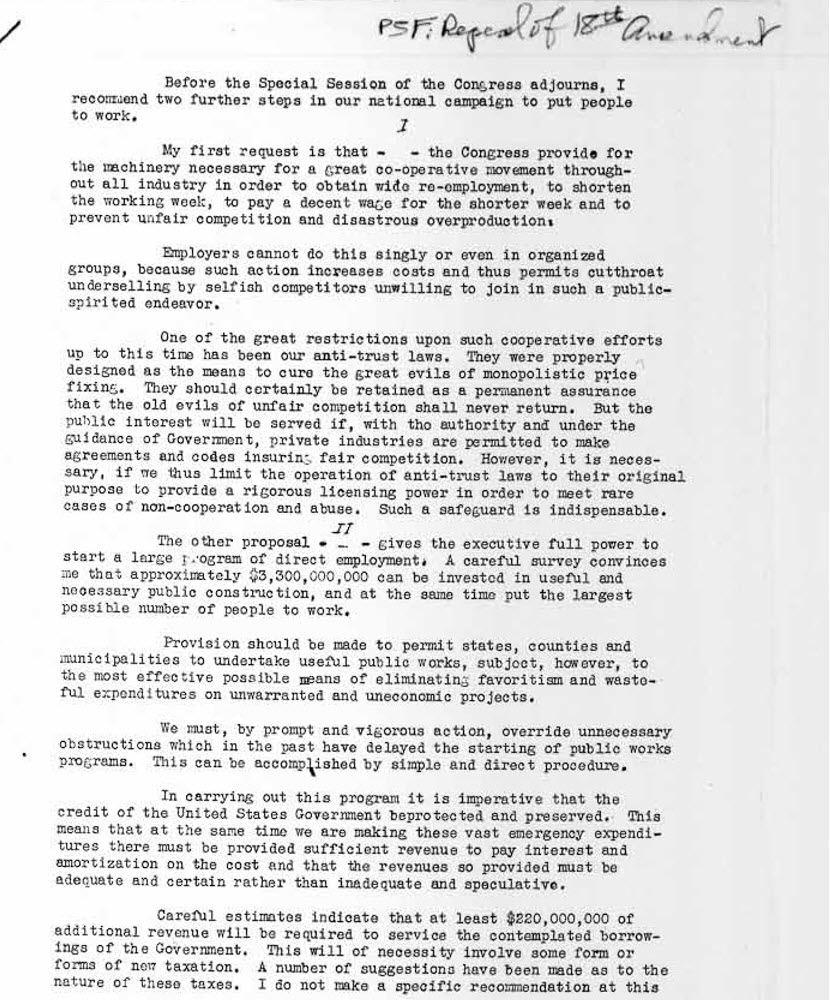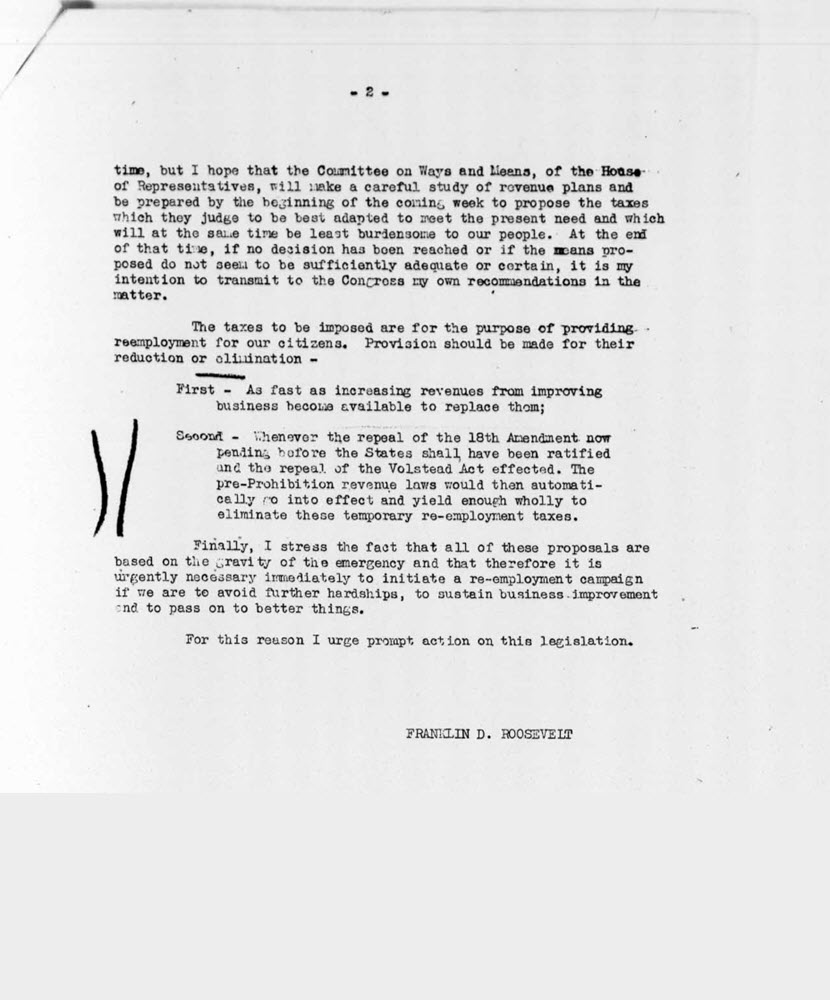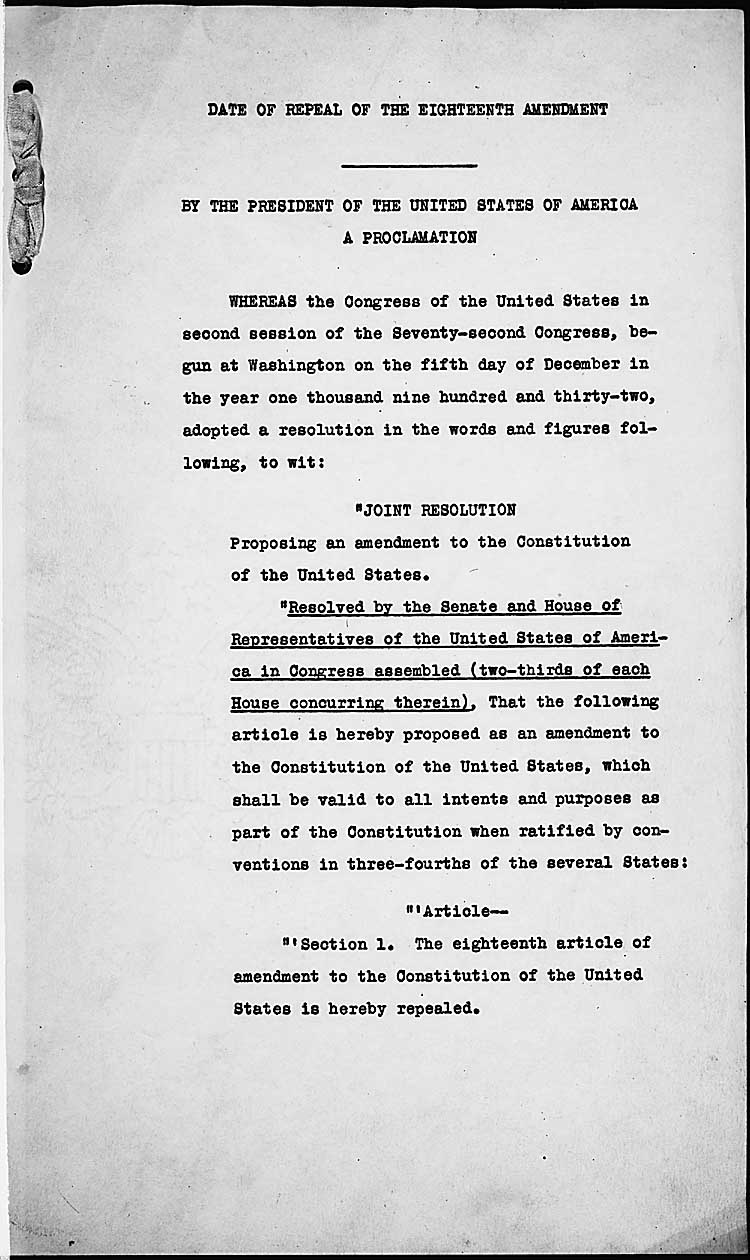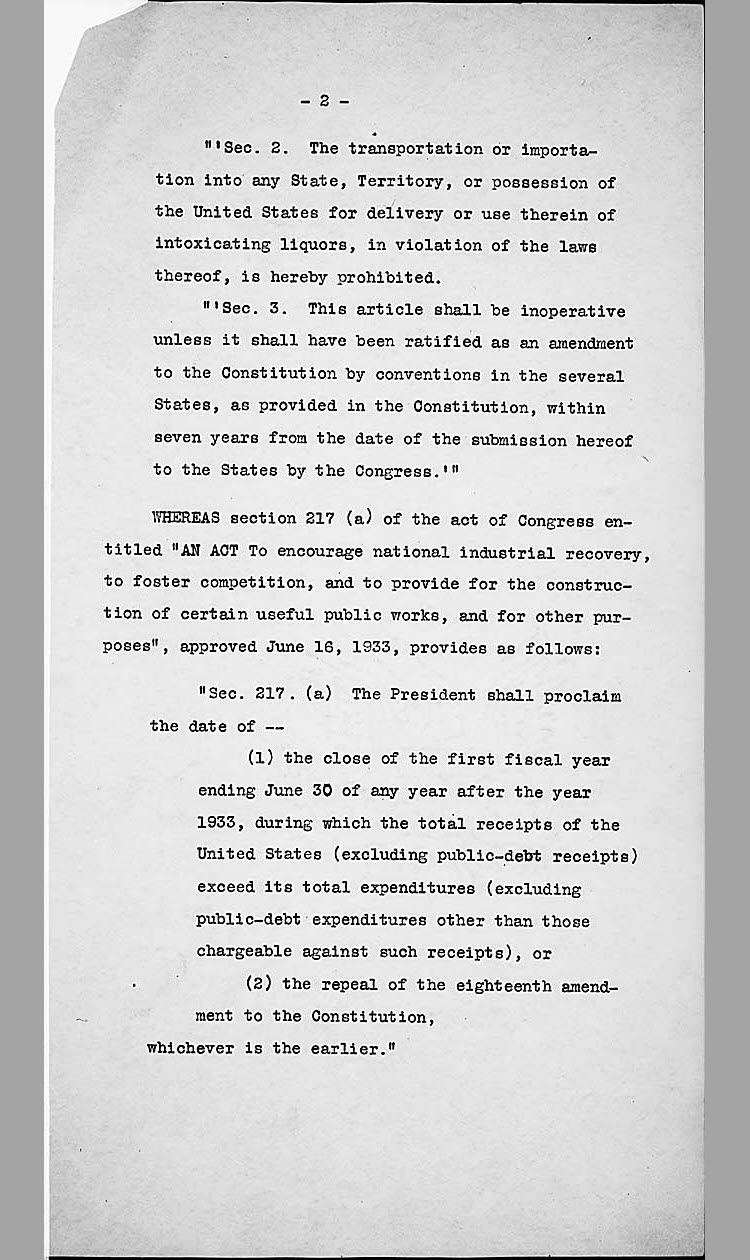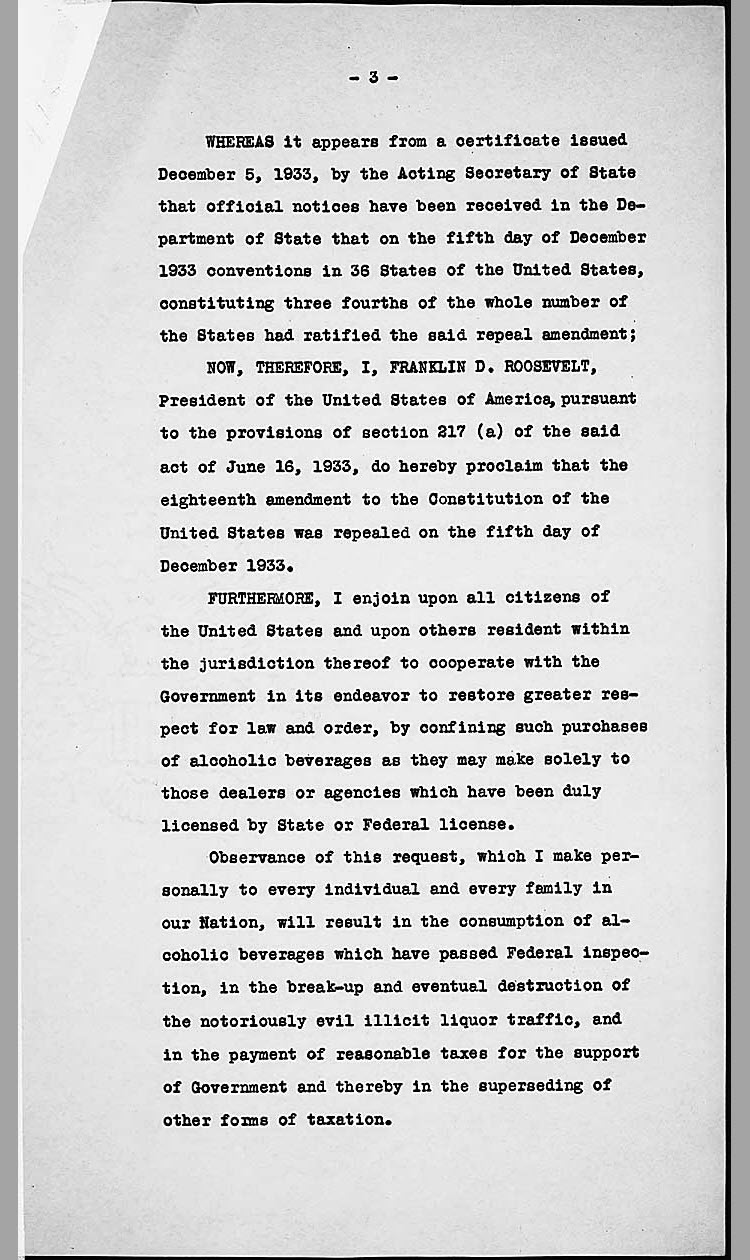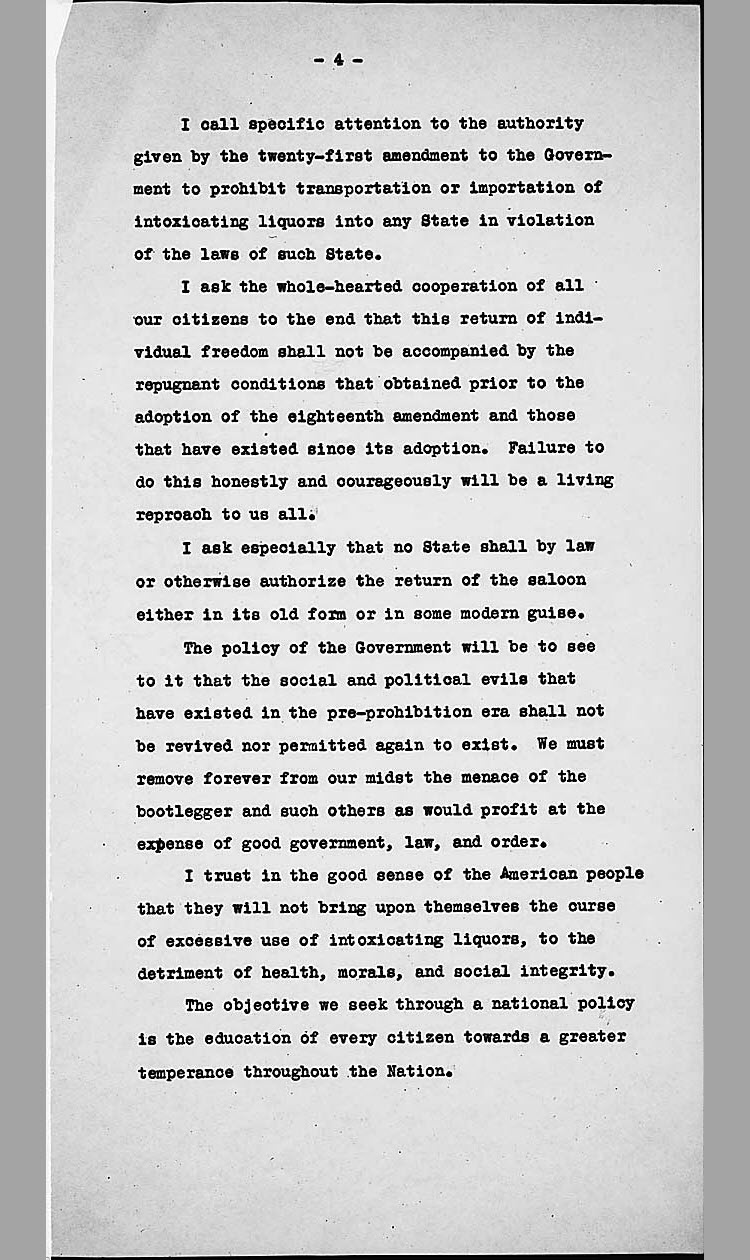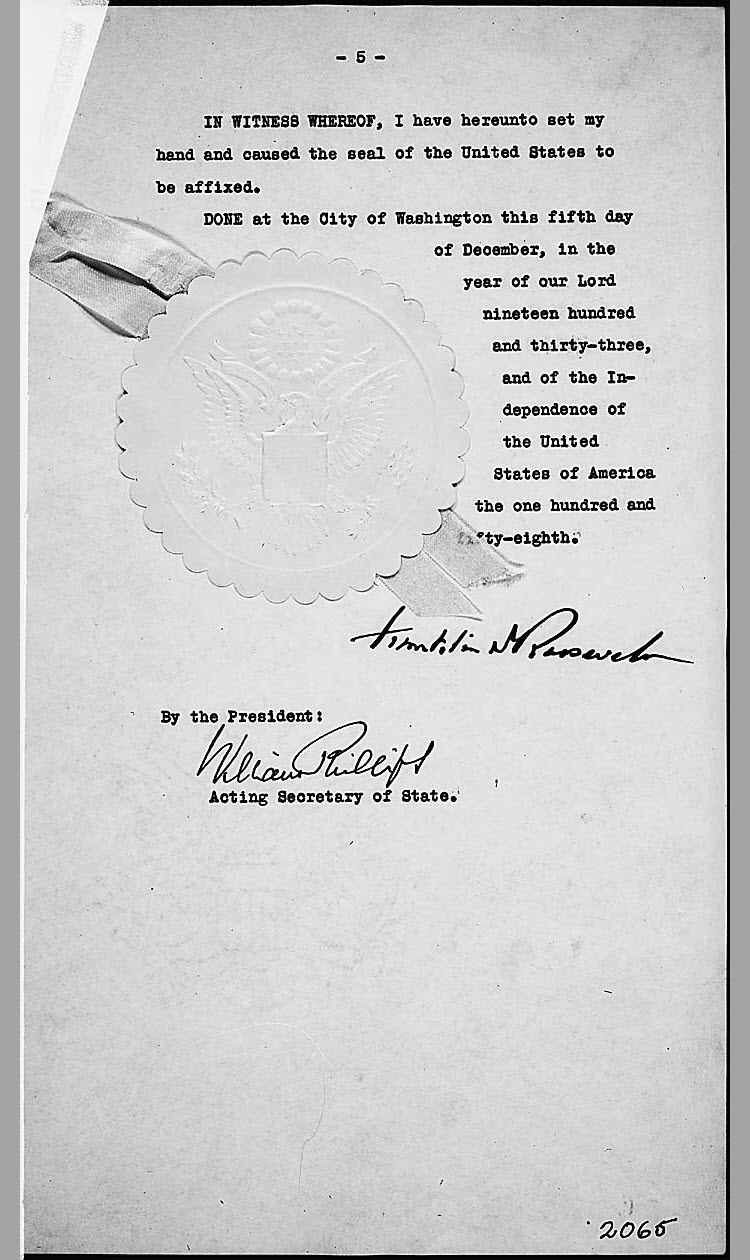
The timing is very interesting, as the U.S. Government works to pass the first major tax reform in nearly 30 years, reading through the history around the end of Prohibition shows that after 84 years not much has changed. You might think the repeal of Prohibition was about making alcohol legal again, of course that was a part of it but as you read between the lines, it was really about regaining the lost tax revenue that went the way of the dinosaur for 13 long, dark years. It’s estimated that Prohibition cost the U.S. Government $13 billion. People never really stopped making and drinking booze, they simply moved it from Main Street to the back streets and back roads of the country. The role of the retailers and distributors shifted to bootleggers and mobsters.
Political Appeal: Do Your Bit – Repeal the Eighteenth Amendment
While running for president of the United States in 1932 then Governor of New York, Franklin D. Roosevelt made it clear, he supported the repeal of the 18th Amendment best known as “Prohibition.” Take a look at this political ad that ran during the time.
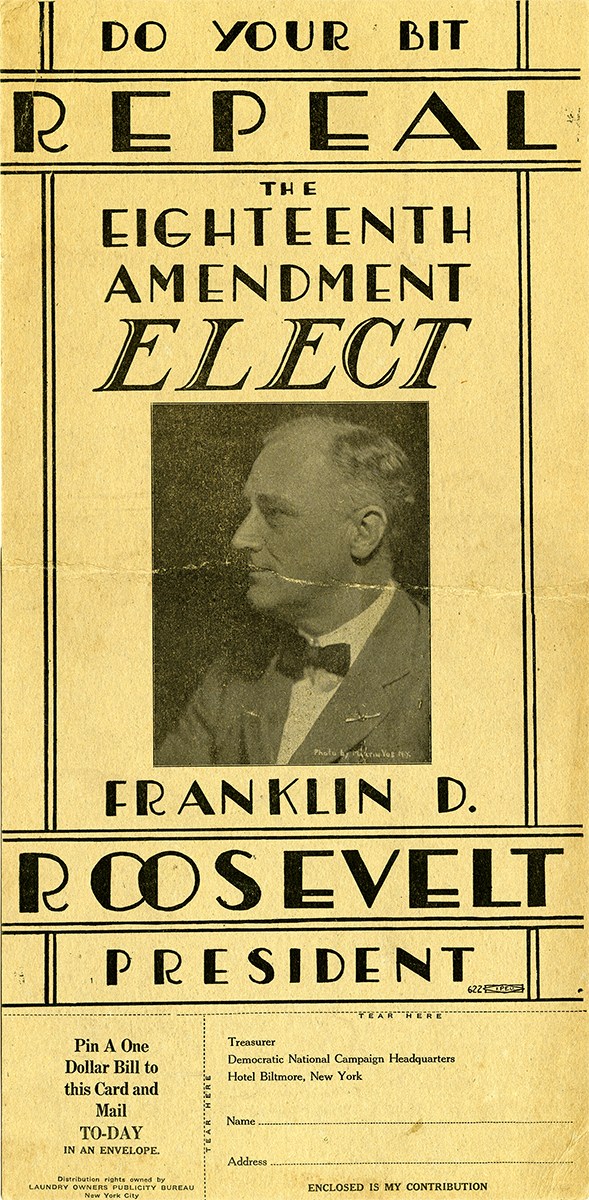
Repeal of the 18th Amendment | Subject File Box 177
A letter from President Franklin D. Roosevelt to the 73rd Congress
To the Congress:
Before the Special Session of the Congress adourns, I recommend two further steps in our national campaign to put people to work.
My first request is this – the Congress provide for the machinery necessary for a great co-operative movement throughout all industry in order to obtain wide re-employment, to shorten the work week, to pay a decent wage for the shorter week and to prevent unfair competition and disastrous overproduction…(full text below.)
The other proposal – gives the executive full power to start a large program of direct employment. A careful survey convinces me that approximately $3,300,000,000 can be invested in useful and necessary public construction, and at the same time put the largest possible number of people to work…(full text below.)
Careful estimates indicate that at least $220,000,000 of additional revenue will be required to service the contemplated borrowings of the Government. This will of necessity involve some form or forms of new taxation. A number of suggestions have been made as to the nature of these taxes. I do not make specific recommendations at this time, but I hope that the Committee on Ways and Means, of the House of Representatives, will make a careful study of revenue plans and be prepared by the beginning of the coming week to propose the taxes which they judge to be best adapted to meet the present need and which will at the same time be least burdensome to our people. At the end of the time, if no decision has been reached or if the means proposed do not seem to be sufficiently adequate or certain, it is my intention to transmit to Congress my own recommendations in the matter.
The taxes to be imposed are for the providing re-employment for our citizens. Provision should be made for their reduction or elimination –
First – As fast as increasing revenue from improving business become available to replace them;
Second – Whenever the repeal of the 18th Amendment now pending before the State shall have been ratified and the repeal of the Volstead Act effected. The pre-Prohibition revenue laws would then automatically go into effect and yield enough wholly to eliminate these temporary re-employment taxes.
Finally, I stress the fact that all of these proposals are based on the gravity of the emergency and that therefore it is urgently necessary immediately to initiate a re-employment campaign if we are to avoid further hardships, to sustain business improvement and to pass on to better things.
For this reason I urge prompt action on this legislation.

Franklin D. Roosevelt
Here’s the complete letter. Click to enlarge.
Stay Informed: Sign up here for the Distillery Trail free email newsletter and be the first to get all the latest news, trends, job listings and events in your inbox.
Here’s the Joint Resolution proposing an amendment to the Constitution of the United States.
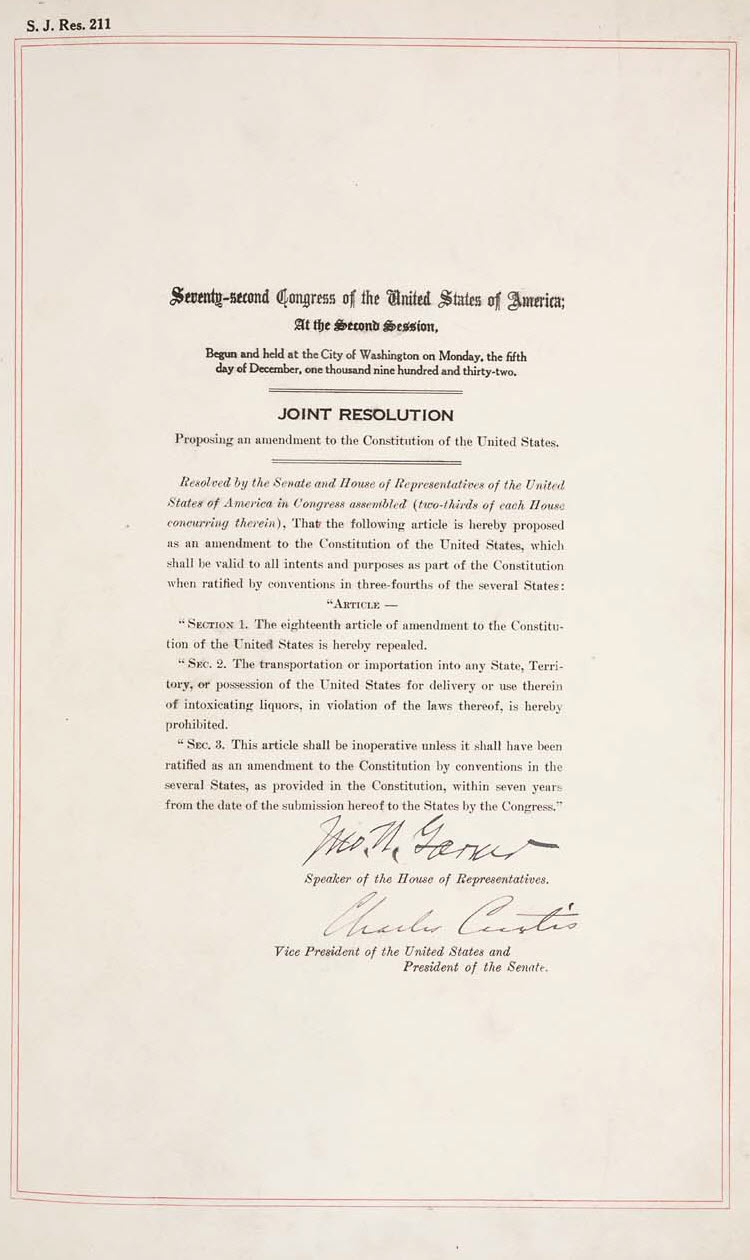
And finally, after 13 dry years on December 5, 1933 at 5:32pm the 21st Amendment was ratified, as announced in this proclamation from President Franklin D. Roosevelt. The 21st Amendment repealed the 18th Amendment ending the increasingly unpopular nationwide prohibition of alcohol.
DATE OF REPEAL OF THE EIGHTEENTH AMENDMENT – Page 1
BY THE PRESIDENT OF THE UNITED STATES OF AMERICA
A PROCLAMATION
WHEREAS the Congress of the United States in second session of the Seventy-second Congress, begun at Washington on the fifth day of December in the year one thousand nine hundred and thirty-two, adopted a resolution in the words and figures following, to wit:
“JOINT RESOLUTION
Proposing an amendment to the Constitution of the United States.
“Resolved by the Senate and House of Representatives of the United States of America in Congress assembled (two-thirds of each House concurring therein), That the following article is hereby proposed as an amendment to the Constitution of the United States, which shall be valid to all intents and purposes as part of the Constitution when ratified by conventions in three-fourths of the several States:
“‘Article–
“‘Section 1. The eighteenth article of amendment to the Constitution of the United States is hereby repealed.
Page 2
“‘Sec. 2. The transportation or importation into any State, Territory, or possession of the United States for delivery or use therein of intoxicating liquors, in violation of the laws thereof, is hereby prohibited.
“‘Sec. 3. This article shall be inoperative unless it shall have been ratified as an amendment to the Constitution by conventions in the several States, as provided in the Constitution, within seven years from the date of the submission hereof to the States by the Congress.'”
WHEREAS section 217 (a) of the act of Congress entitled “AN ACT To encourage national industrial recovery, to foster competition, and to provide for the construction of certain useful public works, and for other purposes”, approved June 16, 1933, provides as follows:
“Sec. 217. (a) The President shall proclaim the date of —
(1) the close of the first fiscal year ending June 30 of any year after the year 1933, during which the total receipts of the United States (excluding public-debt receipts) exceed its total expenditures (excluding public-debt expenditures other than those chargeable against such receipts), or
(2) the repeal of the eighteenth amendment to the Constitution, whichever is the earlier.”
Page 3
WHEREAS it appears from a certificate issued December 5, 1933, by the Acting Secretary of State that official notices have been received in the Department of State that on the fifth day of December 1933 conventions in 36 States of the United States, constituting three fourths of the whole number of the States had ratified the said repeal amendment;
NOW, THEREFORE, I, FRANKLIN D. ROOSEVELT, President of the United States of America, pursuant to the provisions of section 217 (a) of the said act of June 16, 1933, do hereby proclaim that the eighteenth amendment to the Constitution of the United States was repealed on the fifth day of December 1933.
FURTHERMORE, I enjoin upon all citizens of the United States and upon others resident within the jurisdiction thereof to cooperate with the Government in its endeavor to restore greater respect for law and order, by confining such purchases of alcoholic beverages as they may make solely to those dealers or agencies which have been duly licensed by State or Federal license.
Observance of this request, which I make personally to every individual and every family in our Nation, will result in the consumption of alcoholic beverages which have passed Federal inspection, in the break-up and eventual destruction of the notoriously evil illicit liquor traffic, and in the payment of reasonable taxes for the support of Government and thereby in the superseding of other forms of taxation.
Page 4
I call specific attention to the authority given by the twenty-first amendment to the Government to prohibit transportation or importation of intoxicating liquors into any State in violation of the laws of such State.
I ask the whole-hearted cooperation of all our citizens to the end that this return of individual freedom shall not be accompanied by the repugnant conditions that obtained prior to the adoption of the eighteenth amendment and those that have existed since its adoption. Failure to do this honestly and courageously will be a living reproach to us all.
I ask especially that no State shall by law or otherwise authorize the return of the saloon either in its old form or in some modern guise.
The policy of the Government will be to see to it that the social and political evils that have existed in the pre-prohibition era shall not be revived nor permitted again to exist. We must remove forever from our midst the menace of the bootlegger and such others as would profit at the expense of good government, law, and order.
I trust in the good sense of the American people that they will not bring upon themselves the curse of excessive use of intoxicating liquors, to the detriment of health, morals, and social integrity.
The objective we seek through a national policy is the education of every citizen towards a greater temperance throughout the Nation.
Page 5
IN WITNESS WHEREOF, I have hereunto set my hand and caused the seal of the United States to be affixed.
DONE at the City of Washington this fifth day of December, in the year of our Lord nineteen hundred and thirty-three, and of the Independence of the United States of America the one hundred and fifty-eighth.
Franklin D. Roosevelt
By the President:
William Phillips
Acting Secretary of State.
2065
Related Stories
1933 Video Newsreel: Distillery Business Booming after Repeal of Prohibition
The United States of Prohibition Timeline Infographic
The Road to Prohibition: Abridged 1620 to 1920
Here’s the document in its entirety.
The 21st Amendment to the United States Constituion
Click on any image to enlarge.
Please help to support Distillery Trail. Sign up for our Newsletter, like us on Facebook and follow us on Twitter.


